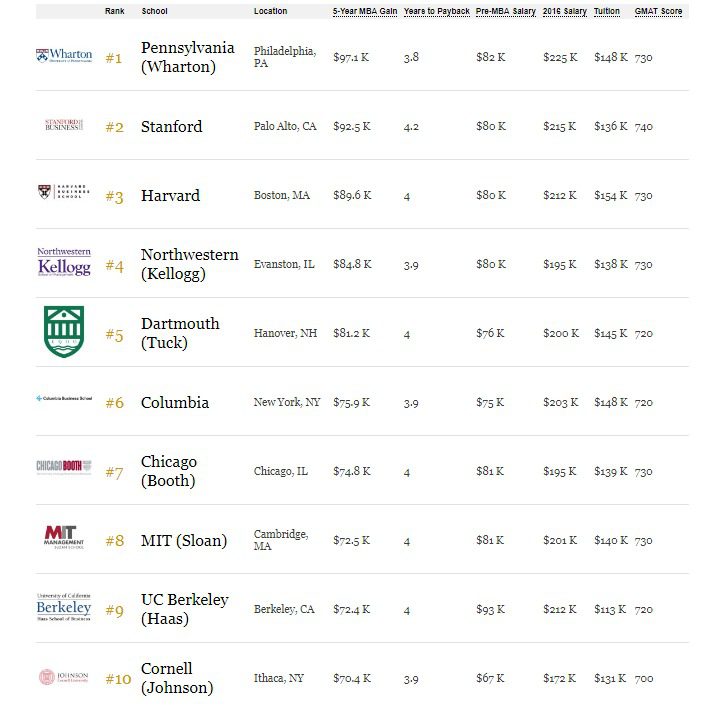Gain a Global Edge with These Philadelphia International Business MBAs

Every day, it becomes easier and easier to make connections across the world, building a global network of business and resources that can help to benefit the world. Due to an increasingly global economy, possessing a deep knowledge and understanding of the way global markets work can be a crucial part of building a business career. There is almost no limit to the types of opportunities an education in global business will provide: from working in the fields of international trade, global business operations or planning or industrial development, and being employed by international agencies, non-profit organizations, governmental, or both public and private corporations.
According to Michigan State program globalEDGE, “demand continues to grow for individuals who understand the global context of business: from the logistics of international trade and cross-border investments to the cultural and ethical issues that are imbued in the practice of business around the world. By studying international business, you will learn about world cultures and societies, and be challenged to approach issues from different perspectives.”
In choosing to study international business in the Philadelphia metro area, aspiring business leaders can center themselves in a growing market at the center of United States history and global trade. We’ve rounded up some of the area’s top MBA programs that offer a concentration in international business, allowing students to gain specific knowledge and skills to make an impact in the global economy.
Fox School of Business – Temple University
Consistently rated one of the top business schools in the country, the Fox School of Business at Temple University offers students a number of opportunities to gain skills and earn a degree in the field of global business. The Global MBA program, based in Philadelphia, is taught by world renowned faculty and is designed to provide an experiential education in international economics, with live consulting, internship and professional development opportunities. Additional programs like the MBA from Temple University Japan in Tokyo and the EMBA at Temple University Paris offer further opportunities for students to gain a hands-on global experience with a strong business background.
Lerner College – University of Delaware
The MBA at University of Delaware’s Lerner College of Business gives students the opportunity to concentrate in international business, providing the solid business background they will need to effectively conduct business in a global environment. In addition to U.S. citizens looking to expand their knowledge in international business and help their organizations to expand overseas, many students in the Lerner MBA program are international, returning home with a deep understanding of U.S. customs and the ability to navigate business across borders.
YOU MAY ALSO LIKE – Searching for the World’s Top MBA Recruiters: Comcast
Rutgers School of Business, Camden
Students interested in concentrating in International Business and Operations can do so at the Rutgers School of Business by pursuing a number of electives in the field. Students can take a number of electives in the fields of International Business and Operations Management to complete the concentration, including courses like: International Management, Global Operations Information Technology, Global Marketing Strategy, and International Study Abroad in countries such as South Africa, France, and Brazil.
Smeal College of Business – Penn State
While the Smeal College of Business at Penn State does not directly offer a concentration or major in international business, it is an available as an option. At Smeal, options constitute a briefer but still targeted study within a particular area, allowing students to gain a deeper education in Global Business while still receiving the more general education of an MBA.
The Wharton School – University of Pennsylvania
The Wharton School at UPenn, well-known as one of the top business schools in the world, provides students the opportunity to pursue a joint MBA/MA in International Studies. The MBA/MA Lauder Joint-Degree provides students a range of resources and educational experiences in global business, such as the Global Knowledge Lab, which involves students working together as a team to produce a thorough research paper/master’s thesis. The program also includes two short global immersions and an optional ten-day trek called Culture Quest, organized completely by students in the program. The six areas of concentration students may choose to specialize in include: Africa, East and Southeast Asia, Europe, Latin America, South Asia, the Middle East, and North Africa.
Finding The Right Online MBA For You

With so many amazing online MBA programs available throughout the country—and without location making the decision for you—it can seem nearly impossible to choose which Online MBA degree program is right for you.
With the increasingly available option to customize your degree in a particular area of emphasis—just as most full-time MBA programs offer—students can gain a competitive edge in their field without ever having to leave their house. In addition, the kind of specialization offerings at each program may help students narrow down the perfect Online MBA for them. Whether your looking to gain industry expertise in accounting or entrepreneurship and anything in between, understanding the areas of emphasis and structure of each degree can be a big help when confronted with such a vast number of impressive programs to choose from.
We take a look at most in demand concentrations available at each of the schools in MetroMBA’s new Online metro, finding what sets each program apart and may make it the perfect degree for you.
Fox School of Business – Temple University
At Temple University’s Fox School of Business, accounting is seen as much more than just calculating numbers—at Fox, it’s “the language of business.” It’s also the most popular area of concentration for students pursuing their MBA online.
The Department of Accounting at Fox focuses on an intense study of the field of accounting, providing students with several opportunities to gain “real-world” experience in the discipline. This sort of experience provides a competitive edge no matter what career path accounting students choose to pursue, which both include and go beyond public accounting.
In addition to students who choose to concentrate in accounting, the Online MBA at Fox is already strongly rooted in the accounting discipline, with all students being responsible for taking an accounting course as a key part of the degree and its curriculum.
Hough Graduate School of Business – University of Florida
If you are looking for a flexible degree that can expand your entrepreneurship knowledge, the Hough Graduate School of Business’ Online MBA may be the perfect degree for you. One of the four options in which students can focus their degree, Entrepreneurship skills are a core part of the Hough School’s curriculum.
Students looking for a more immersive or even global entrepreneurship experience can also take the courses for their concentration within just one week on campus in Gainesville, or taken during a one week international study trip. Of course, students who don’t have the ability to take a week off for this purpose may choose to pursue their Entrepreneurship electives online, as with the rest of the core courses of the degree.
Kelley School of Business – Indiana University
Students looking to focus their MBA in finance will find themselves in good company at Indiana University’s Kelley School of Business. Studying the discipline with the same highly ranked faculty who teach in the full-time MBA program, online students have the chance to round out their degree with electives that particularly focus on the financial applications of their MBA degree.
One reason the study of finance is so popular for online MBA students at Indiana University may be the opportunity to pursue a dual degree, combining their MBA with an online MA in subjects like Finance, Strategic Management, and Business Analytics, among other options. Such an interdisciplinary degree with a strong finance background will give Kelley graduates a competitive edge as they enter the workforce.
FOR YOU: Finding the Best Laptop for Business School
Kenan-Flagler Business School – University of North Carolina
The Online MBA@UNC provides students with a world-class MBA curriculum that allows students to specialize their degree within one of eight special areas. In high demand at UNC is the Management Consulting degree, which prepares students for positions as business consultants.
Even though online programs don’t typically scream “hands on,”the MBA@UNC is build this way, providing consulting students with ample experiential learning and guided practice to gain the necessary leadership and client management skills for success in the consulting field.
Tepper School of Business – Carnegie Mellon University
The Tepper School of Business, ranked as the second best Online MBA by the U.S. News & World Report, is a top MBA for students interested in specializing in Business Analytics.
Students at Tepper have the chance to set their MBA within a particular track, and with the decision to focus on Business Analytics students will be provided with the necessary skills to transform massive amounts of data into usable and analyses to improve the worlds of both business and technology. Graduates from the Business Analytics track at Tepper have accepted jobs from such companies as Amazon, Microsoft, IBM, McKinsey, and more.
W.P. Carey School of Business – Arizona State University
Students looking to specialize their MBA in Supply Chain Management/Logistics may find the perfect degree at Arizona State University’s W.P. Carey School of Business. With so many of the degree’s core courses centered around logistics- such as ‘Decisions, Market Structure and Games’ or ‘Operations and Supply Management’—MBA students can use their electives to even further customize their degree with courses like ‘Supply Chain Cost/Design Issue, ‘Suppler Management and Negotiations,’ among others.
Fox Temple EMBA Jumps in New Financial Times Ranking

When it comes to MBA rankings, the Temple University Fox School of Business is usually remarked for its highly-praised Online MBA. But focusing solely on the business school’s remarkable digital offering overlooks its increasingly well-regarded executive business program.
Last month, the school earned an immense boost in the Financial Times 2017 Executive MBA program rankings, climbing up to 56th from 73rd overall last year—the highest spot in the school’s history. The annual list is typically dominated by joint EMBA programs, such as the Northwestern University Kellogg School of Management and School of Business and Management of The Hong Kong University of Science and Technology’s Kellogg-HKUST EMBA program, which came in 1st overall. In fact, only one non-joint EMBA—the Oxford Saïd School of Business’ EMBA—made it into the top 10.
The Fox School of Business EMBA program came in 10th overall among U.S.-only programs on the new list, as well as 7th among northeastern EMBA programs, and 2nd overall among business schools in Pennsylvania. FT praised the program in particular for it’s “global immersion experience” (ranked 3rd in the U.S.) and for progress students make three years after graduation (ranked 4th globally).
In a press release, Fox School of Business Dean Dr. M. Moshe Porat said, “These latest rankings from Financial Times are indicative of our program’s growing reputation, strength, and return on investment.”
“Further, global immersions and our worldwide partnerships afford students the opportunity to gain global business savvy and study internationally, all through an immersive learning experience,” he continues. “These details continue to set apart our program.”

The Fox School of Business at Temple University.
Michael J. Rivera, Ph.D., Associate Professor of Strategy and Entrepreneurship and Fox EMBA Academic Director, recently spoke on the why the school has seen its ranking ascension, saying, “It is not easy to boil the reason for Fox’s rise in the EMBA Financial times rankings to just one principle, but if I did, I would have to say that it is our commitment to continuous improvement across all areas of our programs.”
On the recent evolution of the program, fueling its incredible rise in the rankings, Rivera remarks, “Over the past three years, we’ve overhauled our program entirely. Repositioned with a strong understanding of the market, we strive to understand the value our students need us to deliver and be curricularly relevant in the eyes of industry.”
Like many of the world’s top-rated programs, the global experience factor of the Fox EMBA heavily contributes to its overall quality. Rivera, who teaches his Creativity, Entrepreneurial Thinking and Innovation Strategy course in multiple international locations, adds, “The Fox EMBA program has numerous campuses globally where we offer our program – Bogota, Lima, Paris, Casablanca, Shanghai, and Tokyo. Stopping at these various campuses is helpful because it keeps me connected with the students and gives me an opportunity to observe the various programs in action. The on the ground insight supports our ability to be aligned and work as a team, even though we are physically in different locations around the world.”
Breaking Down the Benefits
The 48 credit program’s benefits for students is fairly self-explanatory. Fox EMBA graduates earn an eye-popping $156,426 annual salary three years after graduation, as well as a $26,000 bonus increase by the end of the program.
For a business school that may not be casually grouped with Ivy League competition, Rivera believes the success of the EMBA and its graduates comes from the school “punching above its own weight.” This is possible, he says, “because of our dean who is truly entrepreneurial and innovative. His leadership has empowered people to drive change and doesn’t set boundaries on what is possible.”
The FT ranking notes that Fox EMBA grads have seen financial benefit increases across the board, from salary jumps and promotions (4th best among qualified EMBA programs), as well as increases in female and international board members.
Fox EMBA applicants typically join the program with 10 to 15 years of experience, with a limit of 90 students per academic year (45 per cohort). The program can be completed in as little as 16 months and a GMAT waiver is available for select applicants.
For more information on the Fox EMBA, click here.
What Are The Differences Between The World’s Best Online MBA Programs?

Every year, the online MBA becomes an increasingly more attractive option for business school students. With the flexibility to pursue your degree at your own pace and the chance to choose the best MBA program for you without considering location, prospective MBAs can truly make the most of their degree. And though some may be worried about missing out on a traditional classroom experience and the community that comes with it, changing educational technology has made it easier than ever for students to play an important part in their school’s community—without getting out of your pajamas.
The new MetroMBA Online Metro has rounded up some of the best online MBA programs available to students. To help determine which program fits your needs, we take a look at what sets each program apart—and what might just make it the perfect MBA for you.
Fox School of Business — Temple University
The Online MBA Program at Temple University’s Fox School of Business has the distinction of being ranked as the best online MBA in the country, and the best online MBA for veterans, according to U.S. News & World Report. The Online MBA at Fox offers total flexibility for students, with the opportunity to complete the degree within anywhere from 20 months to six years. To help students feel connected with the Fox community, the program offers weekly live web conferencing sessions allowing students to stay connected to faculty and classmates, as well as providing one-and-one career coaching.
The Online MBA at Fox is structured around three required courses that help prepare students for the program, 36 credits that can be completed at the student’s own pace, and a final consulting capstone course that offers total business immersion. The Fox MBA has also been recognized for its benefits for frequent travelers or military members. About 17 percent of students in the most recent class had some form of military experience.
The Fox Online MBA offers a number of areas of study, ranging from HR Management, International Business, Real Estate, Statistical Science, and much more. After completing the program, students on average saw a $30,000-plus salary increase and a median salary of $105,000 three years after graduation.
Hough Graduate School of Business — University of Florida
Although online MBAs tend to be on the rise in recent years, the Hough Graduate School of Business was one of the first business schools to offer a fully accredited online degree—almost twenty years ago. Today, the Financial Times and U.S. News & World Report consistently rank the Hough Online MBA among the top programs in the country.
The Hough Online MBA is the perfect opportunity for students that travel extensively, may move while pursuing their degree, or have a number of weekend commitments. To ensure that students still get face-to-face time with the school’s faculty and classmates, students return to campus once every four months for periodic residencies, allowing them to stay in touch with the community.
The online degree at Hough can be completed in either a two-year or one-year format. Both degrees give students the chance to choose among four areas of focus for their degree: entrepreneurship, finance, marketing, and international. The Hough Online MBA may also be perfect for students looking to immerse themselves in a global business education, as it offers students the chance at a Global Immersion Experience. Students have recently traveled to areas such as Argentina, United Arab Emirates, China, and Ireland.
Kelley School of Business — Indiana University
The Online MBA at the Indiana University Kelley School of Business is made up of 51 credit hours, 39 of which are required courses. The remaining credits can be used towards electives that will help students narrow the focus of their degree in an area such as Business law and ethics, economics, marketing, project management, operations, and more.
Each quarter, Kelley also offers an AGILE course—Accelerating Global Immersion Leadership Education—which frequently partner with top business schools around the globe. Students have recently traveled to such areas as India, Myanmar, South Africa, Botswana and Brazil.
The Kelley Online MBA also stands out because it offers students the chance to earn a dual degree online, pairing their MBA with an online MS in Business Analytics, Global Supply Chain Management, Marketing, Strategic Management, or Entrepreneurship & Innovation.
CHECK THIS OUT: No GMAT, No Problem
Kenan-Flagler Business School — University of North Carolina
The Online MBA at the UNC Kenan-Flagler Business School, better known as the MBA@UNC, may take students anywhere from 18 to 36 months to complete and include nine core courses in foundational business fields, such as economics, introductory finance, business strategy, operations management, and more. Students may also choose from over 30 electives to focus their degree in a particular concentration such as entrepreneurship or management consulting.
The MBA@UNC also requires students to complete two in-person immersions, which may be completed domestically or—for students interested in global business—internationally. Through the Student Teams Achieving Results (STAR) and Doing Business In (DBI) program, students also have the chance to study abroad at an MBA exchange partner school.
The MBA@UNC stands out thanks to its many post-graduate resources thanks to the Career & Leadership team. Replacing traditional on-campus recruiting, a Virtual Company Information Sessions allow executives from a variety of industries throughout the country to communicate with students about the hiring needs of their companies. Alumni can access these resources at any point after their graduation and can also take additional MBA courses as needed for their career development.
Tepper School of Business — Carnegie Mellon University
Carnegie Mellon’s Tepper School of Business offers students a flexible online degree that is completed through a combination of online and on-site experiences throughout a 32 month period. Each week, students will have access to a 70-minute online course that allows them to virtually interact in real time. Throughout the year, they will also be required to attend six “Access Weekends,” held at the university’s various locations throughout the country. The Tepper Online MBA may be the program that provides the most opportunities for in-person contact with classmates and faculty, so students that are interested in more face time as part of their online program may be particularly interested in this degree.
Tepper students are provided with in-depth career coaching and recruitment opportunities. Students will also visit a number of major companies in the country, such as Google, Amazon, JP Morgan, and Microsoft. Within just three months of graduation, roughly 91 percent of students in the Tepper Online MBA program were offered a full-time role.
W.P. Carey School of Business — Arizona State University
The Arizona State University’s Carey School of Business online MBA degree is structured around just one course at a time, each five weeks long. Students are immersed in an inclusive online environment that allows them to interact with classmates through case-based projects.
Carey, in comparison to several other schools noted on this list, is also unique in its option of pursuing a concurrent online degree, such as a Master of Legal Studies, MSE in Electrical Engineering, or MS in Industrial Engineering.
Startup Global Philadelphia Arrives at Temple University Fox School of Business

In late September, Temple’s Fox School of Business hosted Startup Global Philadelphia, which provided resources, strategies, and advice for startups that wanted to expand internationally. The panel topics included: tools and strategies to grow internationally; legal considerations for global startups; startups going global; and government partners and community resources.
One of the overarching themes of the advice given at the event was: take advantage of resources offered to startups. Both the private and public sectors can offer a multitude of resources to help start ups expand their reach.
Export.gov is a resource provided by the Department of Commerce to offer advice and tools meant to help U.S. companies effectively reach global markets. Usman Ahmed, Head of Global Public Policy at PayPal, spoke on a panel, and revealed that PayPal actually has a Global Sellers Program to create versions of company websites specific to different regions. Using cutting targeted marketing techniques, PayPal is able to hone in on exactly which color schemes and verbiage work in various locales.
It is also essential that startup companies looking to go global utilize the professionals who specialize in protecting ideas, such as advisors and lawyers.
“You have to protect [your idea] before you go anywhere. Eighty-six percent of SMEs and independent inventors did no know that their United States trademark of patent would not be protected overseas,” said attorney-advisor at the U.S. Patent and Trademark Office, Benjamin Hardman.
Another theme of the event was: utilize your own knowledge base. Temple student Nigel Satenstein told the origin story of his startup, Pinpointer, which exists to help people without clear addresses benefit from eCommerce.
According to Satenstein, “It all started one day late last summer when I got a call from one of my best childhood friends. He started telling me about his roommate, Sam, who was born and raised in Kathmandu, Nepal, and to this day still down not have a home address.” This story prompted Satenstein and his friends to build a tool that would account for this gap, and because they had personal knowledge of Kathmandu, then chose to start by using the technology there.
The free annual event took place at Temple’s Alter Hall, on 1801 Liacouras Walk.
Startup Global Philadelphia is a collaboration between the U.S. Department of Commerce and the Global Innovation Forum.
Wharton, Stanford Top Forbes’ 2017 Business School Ranking

For the first time ever, the Wharton School at the University of Pennsylvania topped the biennial Forbes list of the best business school’s in the United States.
Coming in second place on the Forbes 2017 rankings, revealed earlier today, was the Stanford Graduate School of Business, which was followed by Harvard Business School, Northwestern’s Kellogg School of Management, and Dartmouth’s Tuck School of Business rounding out the top five.

Forbes‘ top 10 U.S. business schools (2017)
Rounding out the top 20 were some familiar MetroMBA favorites, such as Columbia Business School (6th), Chicago Booth (7th), MIT Sloan (8th), UC Berkeley Haas (9th), UCLA Anderson (15th), the McCombs School of Business UT-Austin (17th), and the Mays Business School at Texas A&M (20th).
Just making the final cut on Forbes’ newest list, which includes only 70 schools, was the Fox School of Business at Temple University (60th), Pepperdine’s Graziadio School of Business and Management (65th), Northeastern’s D’Amore-McKim School of Business (66th), the Kogod School of Business at American University (67th), and the Gabelli School of Business at Fordham University.
Method To The Madness
Nearly every major publication that reveals its own respective business school ranking list has its own principle methodology in which it follows. For instance, unlike Forbes, the Financial Times ranking system relies more on alumni survey responses for its final ranking. While Forbes does utilize surveys in its ranking, its primary focus is on how graduates fare on their return on investment.
In the ranking release, Forbes staff writer Kurt Badenhausen notes:
“Our ranking of business schools is based on the return on investment achieved by the class of 2012. We examined more than 100 schools and reached out to 17,500 alumni around the globe. We compared graduates’ earnings in their first five years out of business school to their opportunity cost (two years of forgone compensation, tuition and required fees) to arrive at a five-year MBA gain, which is the basis for the final rank. Schools whose alumni had response rates below 15 percent or a negative return on investment after five years were eliminated.”
In regards to Wharton topping the 2017 list, Badenhausen writes, “These days most Wharton MBA students head to finance or consulting jobs upon graduation (79 percent of the class of 2012), which traditionally are the most lucrative areas for MBAs. The concentration in these sectors pushed Wharton’s current total compensation for the class of 2012 to the highest of any school in the world at $225,000.”
YOU MIGHT ALSO LIKE: The Highest MBA Salaries in Philadelphia
The exceptional cost of living around Stanford and shockingly low admissions rates (6 percent) contributed to the business school falling off its top spot from the prior year. Stanford GSB graduates, however, were given enormously valuable stock options after earning employment, with a median value of $380,000. Despite the astronomical figures, Stanford GSB grads still saw a dip of around $40,000 in total five-year compensation compared to the Class of 2010. Similarly, HBS grads saw a $28,000 five-year drop compared to the Class of 2010. Wharton 2012 grads, in contrast, gained $18,000 compared to two years prior.
In regards to employment, not much has changed since 2012. McKinsey and Co. was the top employer of the Wharton Class of 2012, hiring over 50 of the school’s 800-plus graduates. Alongside McKinsey were Bain, BCG, and Deloitte, which are still the school’s top employers. However, since then, Amazon has overtaken Goldman Sachs in the Wharton recruitment war.
Thomas Jueng, Seoul native and 2012 Wharton grad, tells Forbes, “Wharton was a great springboard to make a transition geographically and job position-wise with a strong brand name and network as well as providing practical knowledge.”
Read the entire Forbes list of the best U.S. business schools here.
